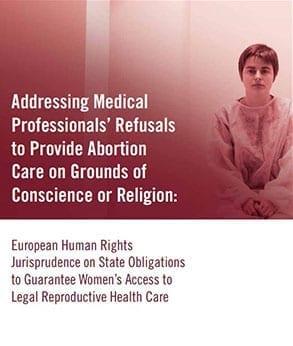U.N. Committee Questions Chile on Its Human Rights Record
(PRESS RELEASE) This week a U.N. committee will review Chile’s track record on economic, social and cultural rights, including the mistreatment of sexual assault survivors and the devastating impact of the country’s abortion ban.
The Center for Reproductive Rights urged the United Nations Committee on Economic, Social and Cultural Rights (U.N. CESCR) to question Chilean officials specifically on the country’s restrictive abortion laws and the barriers sexual assault survivors face when seeking emergency contraception.
In January President Michelle Bachelet of Chile introduced a bill that would allow women access to safe and legal abortion services in cases of sexual violence, fatal fetal impairments and life-endangerment. Currently, nearly 200,000 unsafe abortions occur each year in Chile according to the Guttmacher Institute.
Said Mónica Arango, regional director for Latin America and the Caribbean at the Center for Reproductive Rights:
“For Chile to truly achieve equal rights for all, women’s access to essential reproductive health care and services for survivors of sexual assault must be significantly broadened and robustly protected.
“President Bachelet has taken the first critical step in this fight by prioritizing the long-overdue reforms needed to decriminalize abortion in Chile.
“It’s time for the Chilean Congress to demonstrate their support for women’s health and human rights and ensure this historic bill moves forward immediately.”
The U.N. CESCR oversees compliance with the International Covenant on Economic, Social and Cultural Rights, a treaty obligating member states to ensure equal enjoyment of economic, social and cultural rights for all individuals. In a report to the U.N. CESCR, the Center for Reproductive Rights argued that the restrictive access to emergency contraception and the total criminalization of abortion in Chile violate women’s rights to health, non-discrimination and substantive equality, as well as the right to non-regression, since women previously had access to legal abortion in limited circumstances.
The Center asked the U.N. CESCR to recommend that Chile revise its laws to decriminalize abortion in limited circumstances and to implement policies that prevent sexual violence and ensure survivors get timely access to emergency contraception and other reproductive health services.
Chile’s 1931 health code legalized abortion in limited circumstances, but this reproductive health service was later banned on all grounds in September 1989. From 2001-2012 close to 400,000 women sought post-abortion care in Chilean public hospitals.
In 2013, the National Prosecutor of Chile reported that there were 24,000 known cases of sex-related violence and 74 percent of these cases involved children under the age of 18. Although emergency contraception is the most effective contraceptive method in preventing pregnancy in cases of rape or sexual assault, the Constitutional Court of Chile prohibited the sale, distribution and use of emergency contraception in all public health institutions in 2008. In 2010, the Chilean Congress approved a law reversing the court’s decision, however there is still confusion among women and the medical community on the legality of emergency contraception.
According to a 2014 report published by the Center, 35 countries have amended their laws to expand access to safe and legal abortion services in the last 20 years—a trend that has marked incredible progress toward improving women’s rights and lives, including significantly reducing rates of maternal mortality due to unsafe abortion. The report was released alongside the Center’s updated World’s Abortion Laws map—one of the most comprehensive resources on abortion laws across the globe.

